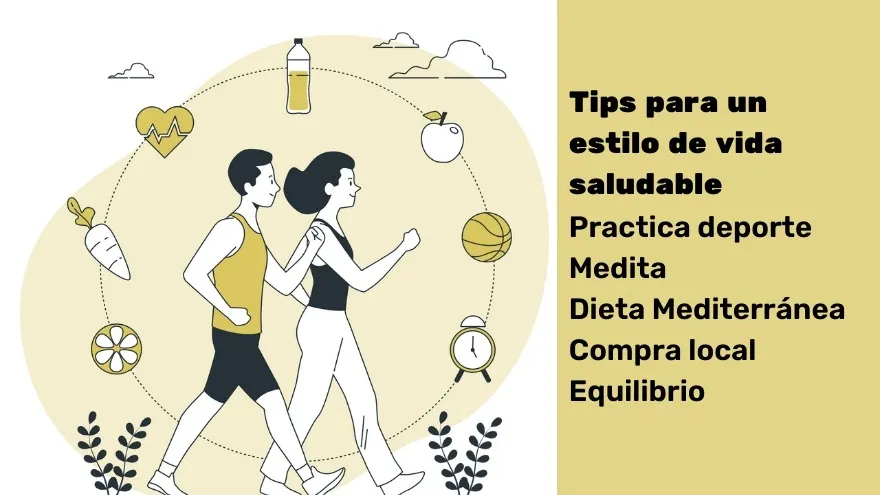When you have a diagnosis of diabetes, the first thing to do is make a mental change to assume that you need to modify certain habits of your lifestyle to control the disease.
Nobody says it is an easy task, that one day to the next you will know how to take care of yourself, but the important thing is to overcome the difficulty and try.Therefore, in this article we share some essential tips for your lifestyle to improve.Try them that is worth it.
Diabetic people have to do everything possible to maintain blood sugar levels.Only with medication (if this is the case), it is not enough, it is necessary to start from the moment you find out, a change in lifestyle.
Some of the keys: are to control carbohydrates, do physical exercise, keep weight, eat healthy and work with a nutritionist.
Healthy eating
Your goal is to consume healthy food, such as what our grandmothers did.Keep this list in mind:
- Eat at regular schedules and do not spend more than 5 hours without eating food.
- Prepare your own healthy food for you and, if possible, for your whole family.May everyone eat healthy is the best plan!
- Read food labels.
- If you are one of those who go crazy for a chop, propose one day a week without meat, and replace these animal proteins with beans and lentils, which are rich, low cost and provide really good plant proteins for you.
- Avoid eating rice or pastes and replaces vegetables.A delicious option to incorporate them is to liquefy them and add them to the sauce.
- Increases the consumption of dietary fibers (legumes, fruits, vegetables).
- Limit or avoid foods rich in aggregate sugars (desserts, drinks).
- Eat less saturated and trans fats (meat, drinks, fried foods).
- It consumes more unsaturated lipids (low fat lactees, baked or grill food, olive oil, seeds).
If you have diabetes, the ideal is to lose between 5 and 10% of your body weight.This helps minimize insulin resistance (especially if you have DM2) and reduce blood glucose.
Stay active
Regular exercise is one of the best tools that a person with diabetes has.Physical activity improves the use of insulin and helps lower blood sugar.As if that were not enough, it helps keep the weight.
Aerobic exercise such as walking is very healthy.Try to make walks of 30, 5 times a week.
A diagnosis of prediabetes or diabetes is not necessary to begin to take care, especially when the type 2 variant takes 2 years to manifest symptoms and can be prevented by correcting some habits in the lifestyle.Pay attention:
Control your weight
A key factor is to control the weight, because a few extra kilos can increase the risk not only of type 2 diabetes, the most common form of the disease, but of other conditions that are associated with overweight such as high levels of cholesterol or triglycerides.
In this sense, a Spanish study suggests that there is a relationship between overweight and the risk of diabetes, in the same way it is the prevalence of dyslipemia, hypertension and metabolic syndrome.For its part, a Venezuelan investigation indicates how important the incidence of excess weight and obesity in the evolution of the DM.
Feed well
It consumes healthy vegetables with a high fiber content, which contributes to lose weight and reduce the risk of diabetes.
Choose fruits (tomatoes, peppers and fruits of the trees), vegetables without starch (green leafy vegetables), legumes (chickpeas, lentils), whole grains (bread, whole and quinoa oat).
It consumes healthy and polyunsaturated -type healthy fats.These improve good cholesterol values and prevent diseases fromheart.Choose vegetable oils (olive, sunflower, carrum), nuts (almonds, peanuts, nuts), seeds (linseed, pumpkin) and fatty fish (salmon, sardines, cod).
Perform physical activity
Regular exercise helps maintain weight, increase insulin sensitivity and maintain glucose in normal ranges.You can choose some of these options:
30 minutes of aerobic exercise (walking, running) of moderate intensity.
2 or 3 times per week of resistance training (weights, yoga).
Avoid miraculous diets
There are very restrictive diets that can help lose weight in a short term, but it is not supported over time and generates the dreaded rebound effect.
For example, abundant hyperproteic diets are very popular in fats and proteins and poor carbohydrates in the treatment of obesity, but there is no scientific evidence that is effective in the long term, indicates a Spanish investigation.


